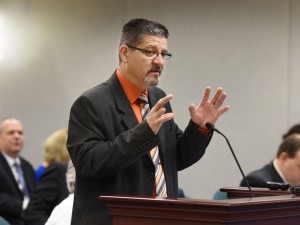
A Florida House panel this morning gave a bipartisan nod to wide-ranging changes to the state’s charter school laws.
Among other things, a proposed bill approved today would make it easier for academically high-performing charters to expand in areas where existing public schools struggle, allow charter school networks to form “local educational agencies” that can receive federal funding directly, and give school districts 30 additional days to vet charter school applications before school boards vote on them.
One of the most-discussed provisions, however, would hold public schools accountable for the performance of high schoolers who leave for private providers or alternative charter schools. The proposed change comes after the state Board of Education and multiple media outlets started investigating whether school districts boosted graduation rates by steering students into alternative education programs.
Ralph Arza of the Florida Charter School Alliance said his group supports almost the entire bill.
But he argued that when students move to alternative charters — which often don’t receive letter grades under the state’s accountability system — their new schools should be accountable for their performance.
“If you’re playing for the Miami Dolphins, your stats don’t go to the New York Jets,” he said.
The proposed change is “well-intentioned,” he added, but for many students who struggled for years in traditional schools, alternative charters are “their last hope.”
State Rep. Bob Cortes, R-Altamonte Springs, who explained the bill to the House PreK-12 Innovation Subcommittee, said he has seen “wonderful” alternative charter schools operating in Central Florida. He said the proposal is intended to ensure districts keep track of every student who attends their schools — and that all students are reflected in their dropout and graduation rates.
“We’re asking them that if [students] move to a private or alternative school, that they report back to the district so we know, and we can compare apples to apples,” he said. “We’re not doing this to hurt anybody.”
Several Democrats said they wanted to see more measures to rein in what Rep. Joseph Abruzzo, D-Wellington, called “fly-by-night” charter schools.
Abruzzo asked if lawmakers could revive a proposal that would require charter schools to post a surety bond before opening. That way, he said, taxpayers would have protection if schools later shut down. He said it’s important to separate charter schools that are up to the task of educating children from those that aren’t.
“There’s no denying it,” he said. “This is the wave of public education. It’s not going to be turned back. Let’s just make it better.”
Rep. Ross Spano, R-Dover, said he sent his kids to charter schools in the Tampa area. Several of those schools were started by parents who didn’t have deep-pocketed organizations behind them, and that might not have been able to raise $250,000 up-front to pay for a surety bond.
“I wonder if there had been that bar … would they have been able to open?” he asked.
The key to stopping shoddy charter operators, he said, is proper screening by school districts when schools first apply to open.



[…] House panel approved a wide-ranging charter school bill. Click here to read […]